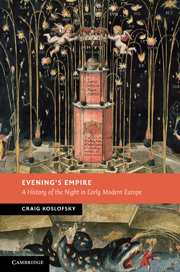Book contents
- Frontmatter
- Contents
- Figures
- Maps
- Acknowledgments
- Chapter One An early modern revolution
- Chapter Two Darkness and the Devil, 1450–1650
- Chapter Three Seeking the Lord in the night, 1530–1650
- Chapter Four Princes of darkness: the night at court, 1600–1750
- Chapter Five “An entirely new contrivance”: the rise of street lighting, 1660–1700
- Chapter Six Colonizing the urban night: resistance, gender, and the public sphere
- Chapter Seven Colonizing the rural night?
- Chapter Eight Darkness and Enlightenment
- Chapter Nine Conclusion
- Notes
- Bibliography
- Index
Chapter One - An early modern revolution
Published online by Cambridge University Press: 05 August 2013
- Frontmatter
- Contents
- Figures
- Maps
- Acknowledgments
- Chapter One An early modern revolution
- Chapter Two Darkness and the Devil, 1450–1650
- Chapter Three Seeking the Lord in the night, 1530–1650
- Chapter Four Princes of darkness: the night at court, 1600–1750
- Chapter Five “An entirely new contrivance”: the rise of street lighting, 1660–1700
- Chapter Six Colonizing the urban night: resistance, gender, and the public sphere
- Chapter Seven Colonizing the rural night?
- Chapter Eight Darkness and Enlightenment
- Chapter Nine Conclusion
- Notes
- Bibliography
- Index
Summary
Alone with Lady Macbeth after his disturbing encounter with Banquo’s ghost (3.4.126), Macbeth asks, “What is the night?” The question is both a common way of asking the time in early modern England, and the inquiry which shapes this book. In the lives of early modern men and women, what was the night? In 1785 the Parisian writer Louis-Sébastien Mercier (1740–1814) confidently stated in an essay on “The Pillow” that “the night is the common benefactress of every thing that breathes.” A century earlier the barber-surgeon Johann Dietz (1665–1738), riding out of Hamburg late at night, unexpectedly came upon three hanged men on a gallows. “Filled with horror,” he reminded himself in his memoir that “the night is no man’s friend.” The ubiquity and ambiguity of the night evoked by the comments of Dietz and Mercier make the night impossible for the historian to pin down, but they also make these hours an extraordinarily revealing vantage point.
For the people of early modern Europe, the night imposed fundamental limits on daily life, at the same time serving as a many-faceted and evocative natural symbol. By connecting the quotidian with the symbolic, I examine the night at the intersection of the history of daily life and cultural history. Bringing empirical evidence from early modern daily life, drawn from diaries, letters, and legal sources, together with the immense trove of representations of the night in early modern religion, literature, and art, this study opens up a new and surprisingly consistent image of Northern Europe in the seventeenth and eighteenth centuries. With overlapping and sometimes conflicting goals poets, princes, courtiers, burghers, and common people “nocturnalized” spiritual and political expression, public space, and their use of daily time. My study is focused on this nocturnalization, defined as the ongoing expansion of the legitimate social and symbolic uses of the night.
- Type
- Chapter
- Information
- Evening's EmpireA History of the Night in Early Modern Europe, pp. 1 - 18Publisher: Cambridge University PressPrint publication year: 2011
- 1
- Cited by



